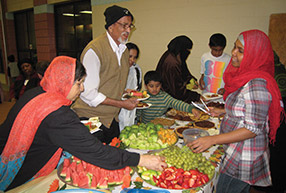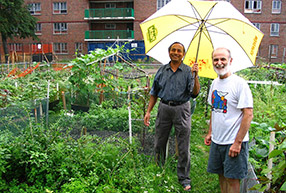
Ready to open this spring, the new Community Food Centre in Toronto’s Regent Park area will build on the foundation of nutrition and gardening programs already established in the neighbourhood. The food centre is the result of a partnership between the Christian Resource Centre and Community Food Centres Canada (CFCC). CFCC supports organizations across the country in developing sustainable community food centres in neighbourhoods where there is a need for this type of programming and where there is available space. Community food centres provide an opportunity for residents to come together to grow, cook, share and advocate for nutritious food. They are a welcome addition in neighbourhoods where residents seek to learn how to cook healthy food on a tight budget. They also facilitate social interaction and provide a welcome hub for meeting new people.

The Regent Park Community Food Centre will consist of a garden that will provide fresh produce for the community meal and supper programs. The community meal program serves as many as 150 people for breakfast and lunch five days a week. The supper program engages residents in food preparation and includes a peer advocacy component, where residents learn skills to support one another in times of need.
Through these programs, residents form social ties and develop meaningful relationships, which help them cope in times of adversity. They also expand their social support networks and become better connected with community resources and services. Communities that are strong and connected are better able to advocate for social issues that impact their quality of life.
Another benefit of community food centres is that they increase green space in neighbourhoods. The gardening component enables individuals to become immersed in nature and increases their physical activity, which improves their sense of well-being. Knowing how to grow and prepare food is a skill that empowers residents and improves their self-esteem.
Additionally, residents’ capacity to access healthy food for themselves and their family is not constrained by a limited budget or a lack of food preparation skills. Their ability to eat well and provide for their family improves their sense of personal agency, which leads to gains in mental health.